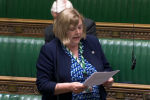Transcript:
I will deal with just two aspects of productivity, as that is the theme of today’s Budget. I will first talk about the VAT threshold. Small and medium-sized enterprises are the backbone of our economy, both nationally and locally. They not only provide jobs that hard-working families depend on but are the key to turbocharging productivity across the UK and levelling up our regions and nations. That could not be more true than in my constituency, where SMEs are responsible for the lion’s share of business activity and employment. The past few years have been particularly challenging for SMEs, as they have had to navigate various things such as the covid-19 pandemic and the commodity shortages and inflationary pressures brought on by the war in Ukraine. I have therefore been fiercely vocal about the need to do all we can to support them.
I know the Government have been working hard to protect and support businesses as much as possible through these times, recognising the need to fulfil our responsibility to get the economy back on track. I therefore welcome a number of the announcements in the Budget—in particular, the decision to increase the VAT registration threshold to £90,000 from 1 April 2024. As the Chancellor said in his speech, I have been pressing for that as it will support businesses with the administrative and financial impact of VAT charges. It will ensure they can earn more before paying VAT and spend more time working. Hairdressing and hospitality sector businesses in Loughborough raised that point with me, and I in turn brought it to the attention of the Chancellor and Business Ministers. The increase in the threshold will mean that those businesses can earn more money before any VAT is due. That will not only mean that hard-working business owners will get the opportunity to earn more before tax but that self-employed trades will be able to complete more work before attracting VAT charges to their contracts.
As the Chancellor said in his Budget speech, “the way to improve public services is not always more money or more people; we also need to run them more efficiently. We need a more productive state, not a bigger state.”
The announcement of the public sector productivity programme to reform the delivery of frontline public services and improve productivity is welcome. The Government said that alongside that programme a £230 million pilot will be established to “roll out cutting-edge technology such as live facial recognition, automation and the use of drones as first responders.”
They also said: “The government will establish a Centre for Police Productivity to support police forces’ use of data and deliver this technology, maximising productivity and the use of AI.”
Again, I say to my hon. Friend the Minister that we do not always need more money. I would be interested to hear from him whether the remit of that centre will extend to looking at ways to reduce the reaction burdens placed on police officers due to data protection requirements.
As I have said a number of times in the House, the Data Protection Act 2018 contains no provision to facilitate the free flow of personal data between the police and the Crown Prosecution Service. When the police are preparing a case file for a charging decision, they have to analyse the information gathered by investigating officers in order to identify every item of personal data, decide whether it is necessary for the CPS to consider each item when making its decision, and redact every item that does not meet that test. Those obligations delay and obstruct the expeditious progress of the criminal justice system, and in some cases add to the likelihood that the victim will withdraw their support. Much of that data is never even used by the CPS if it decides not to charge or the defendant pleads guilty before trial. Nationally, about 25% of cases submitted to the CPS are not charged. The Police Federation of England and Wales has estimated that, on average, a staggering 365,000 policing hours are consumed in complying with redaction obligations. That equates to an annual cost to the taxpayer of more than £5.6 million.
The Government have previously highlighted their support for the use of technology to reduce that burden. However, that would go only so far and would still require police officers to oversee that work. The best solution would be to change the law so that the redaction of personal data by the police could occur after, rather than before, the CPS has made a charging decision. In that way, only cases that are to go forward for prosecution will have been worked on. That practical solution would prevent the waste of time by police officers, who can then spend more time on the beat—something that my constituents asked for in a recent crime survey that I undertook in Loughborough. The Government have been clear that it is necessary to reduce administrative burdens on public sector workers and boost productivity. This change, unlike rolling out new technology, would cost nothing to implement but would save a substantial amount of taxpayers’ money and get police officers back on the frontline supporting communities and tackling crime. Those are the two aspects that I wanted to look at.

